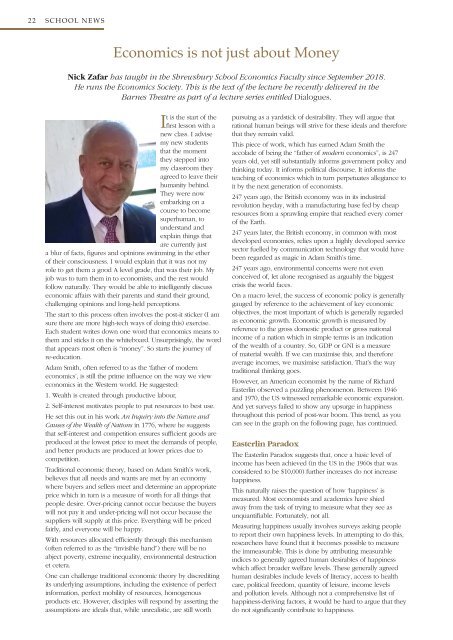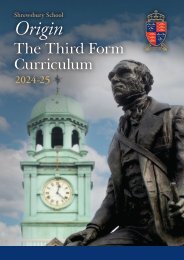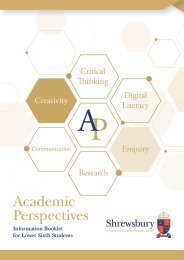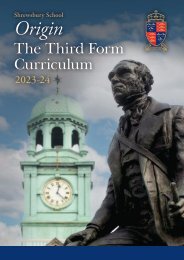The Salopian Summer 2023
v2
v2
You also want an ePaper? Increase the reach of your titles
YUMPU automatically turns print PDFs into web optimized ePapers that Google loves.
22<br />
SCHOOL NEWS<br />
Economics is not just about Money<br />
Nick Zafar has taught in the Shrewsbury School Economics Faculty since September 2018.<br />
He runs the Economics Society. This is the text of the lecture he recently delivered in the<br />
Barnes <strong>The</strong>atre as part of a lecture series entitled Dialogues.<br />
It is the start of the<br />
first lesson with a<br />
new class. I advise<br />
my new students<br />
that the moment<br />
they stepped into<br />
my classroom they<br />
agreed to leave their<br />
humanity behind.<br />
<strong>The</strong>y were now<br />
embarking on a<br />
course to become<br />
superhuman, to<br />
understand and<br />
explain things that<br />
are currently just<br />
a blur of facts, figures and opinions swimming in the ether<br />
of their consciousness. I would explain that it was not my<br />
role to get them a good A level grade, that was their job. My<br />
job was to turn them in to economists, and the rest would<br />
follow naturally. <strong>The</strong>y would be able to intelligently discuss<br />
economic affairs with their parents and stand their ground,<br />
challenging opinions and long-held perceptions.<br />
<strong>The</strong> start to this process often involves the post-it sticker (I am<br />
sure there are more high-tech ways of doing this) exercise.<br />
Each student writes down one word that economics means to<br />
them and sticks it on the whiteboard. Unsurprisingly, the word<br />
that appears most often is “money”. So starts the journey of<br />
re-education.<br />
Adam Smith, often referred to as the ‘father of modern<br />
economics’, is still the prime influence on the way we view<br />
economics in the Western world. He suggested:<br />
1. Wealth is created through productive labour,<br />
2. Self-interest motivates people to put resources to best use.<br />
He set this out in his work An Inquiry into the Nature and<br />
Causes of the Wealth of Nations in 1776, where he suggests<br />
that self-interest and competition ensures sufficient goods are<br />
produced at the lowest price to meet the demands of people,<br />
and better products are produced at lower prices due to<br />
competition.<br />
Traditional economic theory, based on Adam Smith’s work,<br />
believes that all needs and wants are met by an economy<br />
where buyers and sellers meet and determine an appropriate<br />
price which in turn is a measure of worth for all things that<br />
people desire. Over-pricing cannot occur because the buyers<br />
will not pay it and under-pricing will not occur because the<br />
suppliers will supply at this price. Everything will be priced<br />
fairly, and everyone will be happy.<br />
With resources allocated efficiently through this mechanism<br />
(often referred to as the “invisible hand”) there will be no<br />
abject poverty, extreme inequality, environmental destruction<br />
et cetera.<br />
One can challenge traditional economic theory by discrediting<br />
its underlying assumptions, including the existence of perfect<br />
information, perfect mobility of resources, homogenous<br />
products etc. However, disciples will respond by asserting the<br />
assumptions are ideals that, while unrealistic, are still worth<br />
pursuing as a yardstick of desirability. <strong>The</strong>y will argue that<br />
rational human beings will strive for these ideals and therefore<br />
that they remain valid.<br />
This piece of work, which has earned Adam Smith the<br />
accolade of being the “father of modern economics”, is 247<br />
years old, yet still substantially informs government policy and<br />
thinking today. It informs political discourse. It informs the<br />
teaching of economics which in turn perpetuates allegiance to<br />
it by the next generation of economists.<br />
247 years ago, the British economy was in its industrial<br />
revolution heyday, with a manufacturing base fed by cheap<br />
resources from a sprawling empire that reached every corner<br />
of the Earth.<br />
247 years later, the British economy, in common with most<br />
developed economies, relies upon a highly developed service<br />
sector fuelled by communication technology that would have<br />
been regarded as magic in Adam Smith’s time.<br />
247 years ago, environmental concerns were not even<br />
conceived of, let alone recognised as arguably the biggest<br />
crisis the world faces.<br />
On a macro level, the success of economic policy is generally<br />
gauged by reference to the achievement of key economic<br />
objectives, the most important of which is generally regarded<br />
as economic growth. Economic growth is measured by<br />
reference to the gross domestic product or gross national<br />
income of a nation which in simple terms is an indication<br />
of the wealth of a country. So, GDP or GNI is a measure<br />
of material wealth. If we can maximise this, and therefore<br />
average incomes, we maximise satisfaction. That’s the way<br />
traditional thinking goes.<br />
However, an American economist by the name of Richard<br />
Easterlin observed a puzzling phenomenon. Between 1946<br />
and 1970, the US witnessed remarkable economic expansion.<br />
And yet surveys failed to show any upsurge in happiness<br />
throughout this period of post-war boom. This trend, as you<br />
can see in the graph on the following page, has continued.<br />
Easterlin Paradox<br />
<strong>The</strong> Easterlin Paradox suggests that, once a basic level of<br />
income has been achieved (in the US in the 1960s that was<br />
considered to be $10,000) further increases do not increase<br />
happiness.<br />
This naturally raises the question of how ‘happiness’ is<br />
measured. Most economists and academics have shied<br />
away from the task of trying to measure what they see as<br />
unquantifiable. Fortunately, not all.<br />
Measuring happiness usually involves surveys asking people<br />
to report their own happiness levels. In attempting to do this,<br />
researchers have found that it becomes possible to measure<br />
the immeasurable. This is done by attributing measurable<br />
indices to generally agreed human desirables of happiness<br />
which affect broader welfare levels. <strong>The</strong>se generally agreed<br />
human desirables include levels of literacy, access to health<br />
care, political freedom, quantity of leisure, income levels<br />
and pollution levels. Although not a comprehensive list of<br />
happiness-deriving factors, it would be hard to argue that they<br />
do not significantly contribute to happiness.
















